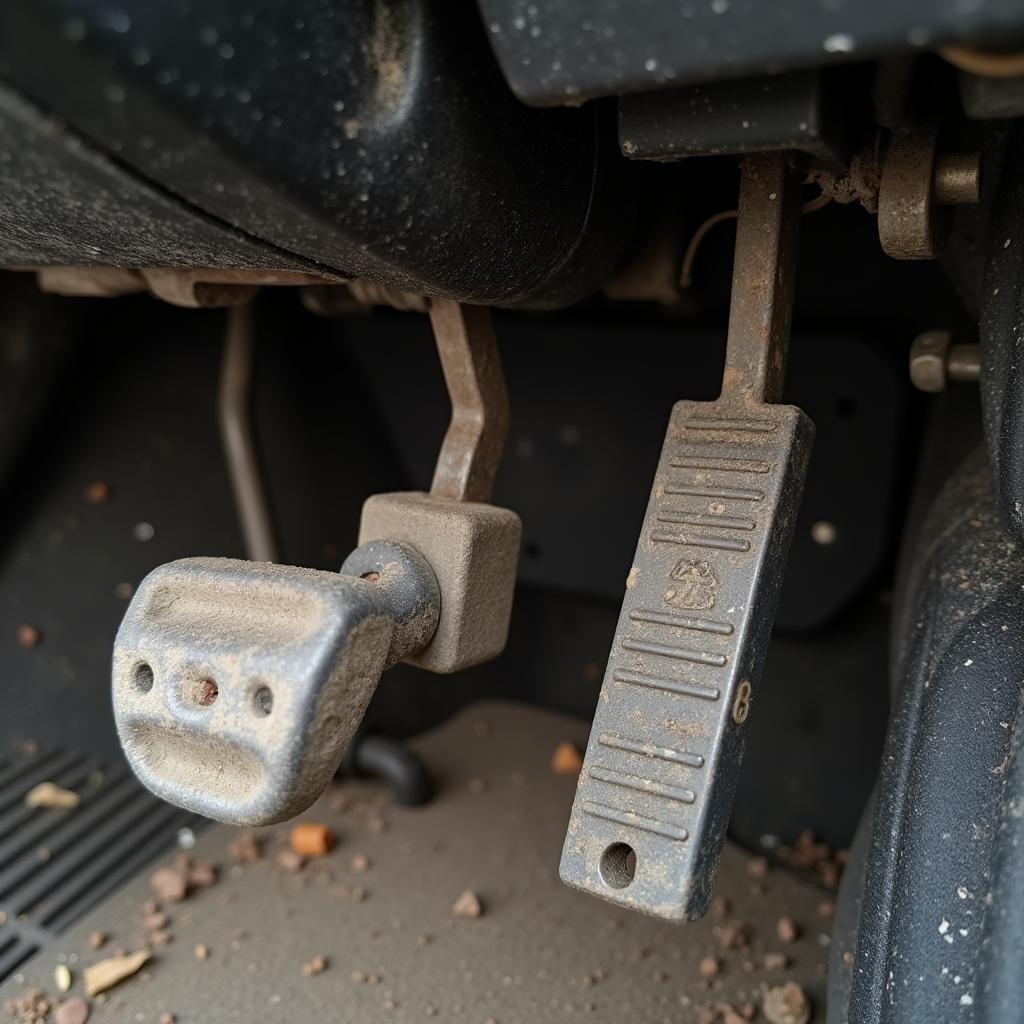Car Gas Pedal Problems can range from a simple sticky pedal to more complex electronic issues. Understanding the potential causes and solutions can save you time, money, and frustration. This guide will help you diagnose and address common gas pedal problems, whether you’re a car owner, mechanic, or technician.
 Sticky Gas Pedal Causes: Dirt, debris, and wear can cause a sticky gas pedal.
Sticky Gas Pedal Causes: Dirt, debris, and wear can cause a sticky gas pedal.
One of the most common gas pedal problems is a sticky pedal. This can be caused by a build-up of dirt and debris, a worn or damaged pedal linkage, or a faulty throttle position sensor. If you’re experiencing this issue, try cleaning the pedal and linkage with a specialized cleaner. If that doesn’t solve the problem, you may need to replace the pedal assembly or the throttle position sensor. If you’ve ever experienced a situation where you had to gas your car to start it, you might want to check out this article on car problems had to gas car to start.
Diagnosing Car Gas Pedal Problems
Diagnosing car gas pedal problems requires a systematic approach. Start by checking the pedal itself for any obvious signs of damage or obstruction.
Checking the Pedal and Linkage
Inspect the pedal for any physical damage, such as cracks or bends. Next, check the linkage connecting the pedal to the throttle body for any signs of wear, damage, or obstruction. A loose or disconnected linkage can cause a loss of power or a complete failure of the gas pedal.
Inspecting the Throttle Position Sensor
The throttle position sensor (TPS) is a critical component that tells the engine control unit (ECU) how much fuel to inject based on the position of the gas pedal. A faulty TPS can cause a variety of problems, including a hesitant or unresponsive gas pedal, rough idling, and poor fuel economy.
Common Gas Pedal Problems and Solutions
From a simple sticky pedal to complex electronic issues, there are a range of problems you might encounter.
Sticky Gas Pedal
A sticky gas pedal can be incredibly dangerous. It’s crucial to address this issue promptly. Often, a simple cleaning of the pedal assembly and lubrication of the moving parts can solve the problem. However, a worn-out pedal or linkage may require replacement. Sometimes, a gem car problem can manifest as a sticky gas pedal.
Unresponsive Gas Pedal
An unresponsive gas pedal can be caused by several factors, including a faulty TPS, a wiring issue, or a problem with the ECU. Diagnosing this requires checking the electrical connections, testing the TPS, and potentially using a diagnostic scanner to read error codes from the ECU. “A thorough inspection is key to identifying the root cause of an unresponsive gas pedal,” says automotive expert, Robert Johnson, ASE Certified Master Technician.
Gas Pedal Too Sensitive
A gas pedal that feels too sensitive can be caused by a faulty TPS, a problem with the throttle cable, or even a software issue. Adjusting the throttle cable tension or recalibrating the TPS might solve the problem. In some cases, problems with the car’s cylinders can affect the gas pedal’s responsiveness. You can learn more about such issues in this article about car cylinder problems.
Intermittent Gas Pedal Problems
Intermittent problems can be the most challenging to diagnose. They often point to loose connections, failing sensors, or wiring issues. “Intermittent issues require patience and careful observation to pinpoint the source of the problem,” advises Emily Carter, automotive engineer. Sometimes, these issues may be related to how you start your car, especially if you have alternator problems. Check out this resource on how to start a car with alternator problems for more information.
Conclusion
Car gas pedal problems can significantly impact your driving experience and safety. Understanding the common issues and their solutions can help you address them effectively. Remember to always prioritize safety and consult a qualified mechanic if you are unsure about any aspect of the diagnosis or repair process. For further assistance, feel free to contact AutoTipPro at +1 (641) 206-8880 or visit our office at 500 N St Mary’s St, San Antonio, TX 78205, United States. We are always here to help you with your car gas pedal problems and other automotive issues. If you own a Prius C and are experiencing gas pedal problems, you might want to check this article for specific issues related to this model: prius c car problems.




Leave a Reply